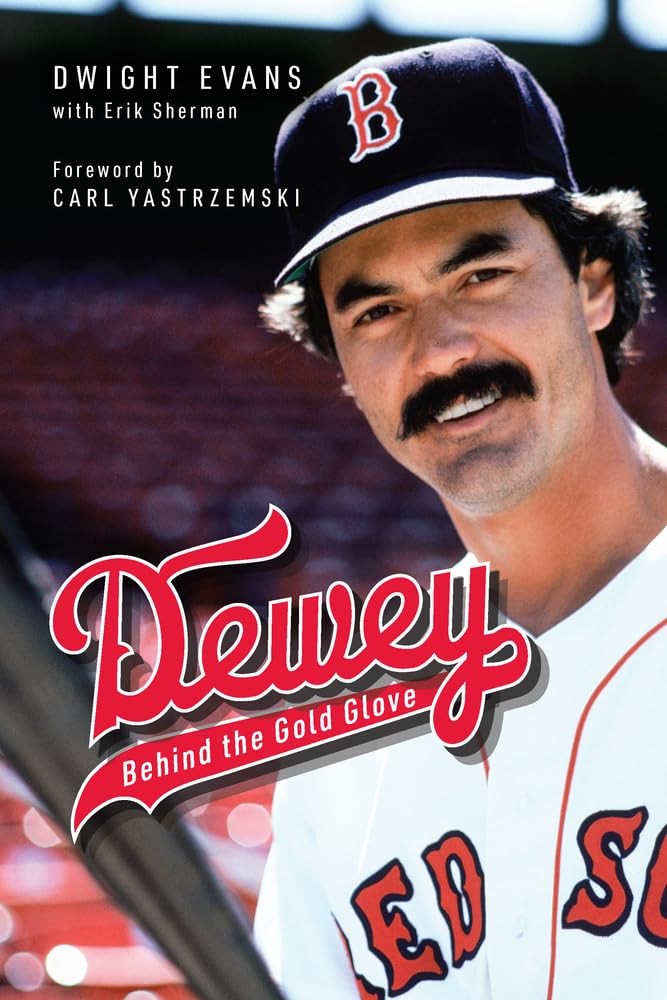Thank you Triumph Books for providing this book for review consideration. All opinions are my own.
Mr. Book just finished Dewey: Behind the Gold Glove, by Dwight Evans, with Erik Sherman.
Dwight Evans was one of the best outfielders of his day and one of the best in Red Sox history. He was known for having one of the great throwing arms of his era and for a classic play in the 1975 World Series. He has emerged as a legitimate candidate to eventually go into the Hall of Fame by the era committees and a case can be made that he was even more deserving than teammate Jim Rice, who already has a plaque in Cooperstown.
But, it also became clear very early on that this wasn’t just a book on Evans’s playing career. His memoir was also that of a father who lost two young sons to Neurofibromatosis, a form of brain cancer. Evans mostly carried that burden on himself during his career. His only teammate who knew was Carl Yastrzemski, who he only told because Yaz had also experience with a sick child. Even Rice, who Evans was teammates with for 16 years did not know until he read about it in a newspaper article.
One of the great things about baseball and history books is all of the interesting little tidbits that are contained in them. A great example from this book was when Evans talked about one of his instructors in the minor leagues. I never knew, and never would have imagined, that the Red Sox, with their terrible history on racial matters, would have been the ones who hired Jesse Owens as a running coach.
But, it was Evans’s experiences with another all-time great athlete, Ted Williams, that really stood out. Willians, at least in their first encounters written about, acted exactly how you would have expected (at least by those of us old enough to remember before Williams’ image was whitewashed by an old grandfatherly image).
A highlight of the book was the 1975 World Series. But Evan’s was completely wrong when he said, “It was also the last ‘pure’ World Series.” That should say it was the last World Series before the 1976 World Series, which was the last one under the oppressive labor system in which players had no control over their employment.
I enjoyed the part about the 1976 Yankees-Red Sox brawl where Graig Nettles injured Bill Lee and how Lee, tongue-in-cheek has blamed Evans since, if he didn’t make a perfect throw to the plate to get Piniella out then the whole brawl could have been avoided.
The chapters on the eventful 1976-78 seasons, which included that brawl, the powerful 1977 Red Sox lineup losing a race to the Yankees and then the Red Sox losing their 14-game in 1978, culminating in the one-game playoff were among the highlights of the book.
The chapters on the 1986 ALCS and World Series were also strong points of the book. I had not known that, after Bob Stanley threw his wild pitch to tie Game 6 of the World Series, Rich Gedman had signaled to second on a pick-off play and the Red Sox would have been able to nail Ray Knight to get out of the inning. But, Stanley pitched to the plate instead. The pick-off play was still on for the next pitch, but instead Stanley threw the pitch that Mookie Wilson would hit through Bill Buckner’s legs.
One does not need to be a Red Sox to enjoy this book. I certainly am not, as I have been a lifelong Yankees fan. But, I still give this book an A. Goodreads requires grades on a 1-5 star system. In my personal conversion system, an A equates to 5 stars. (A or A+: 5 stars, B+: 4 stars, B: 3 stars, C: 2 stars, D or F: 1 star).
This review has been posted at my blog, Mr. Book’s Book Reviews, and Goodreads
Mr. Book originally finished reading this on June 10, 2024.


